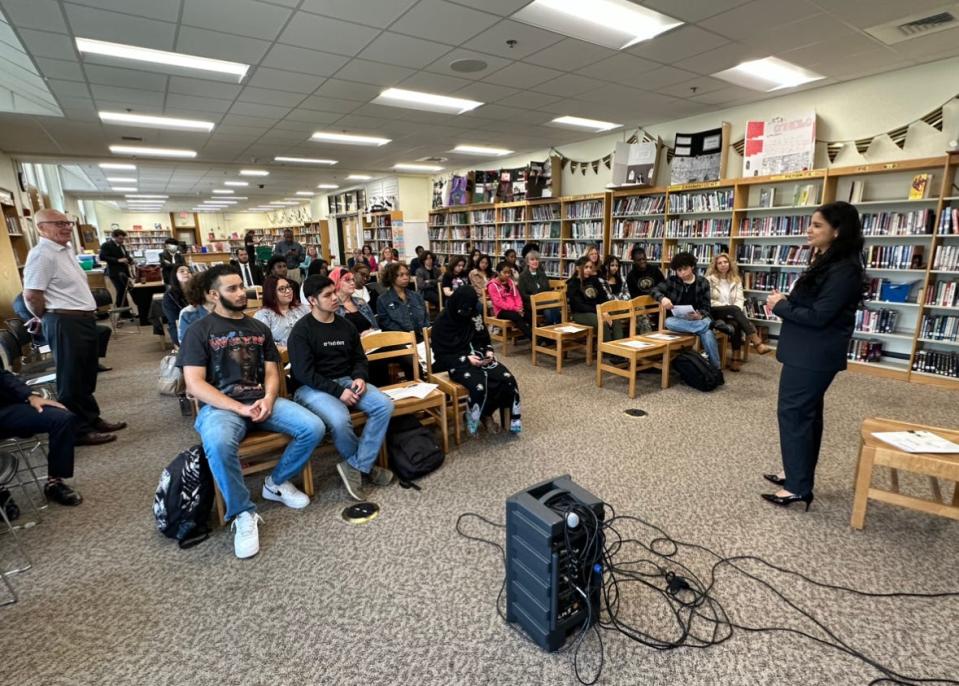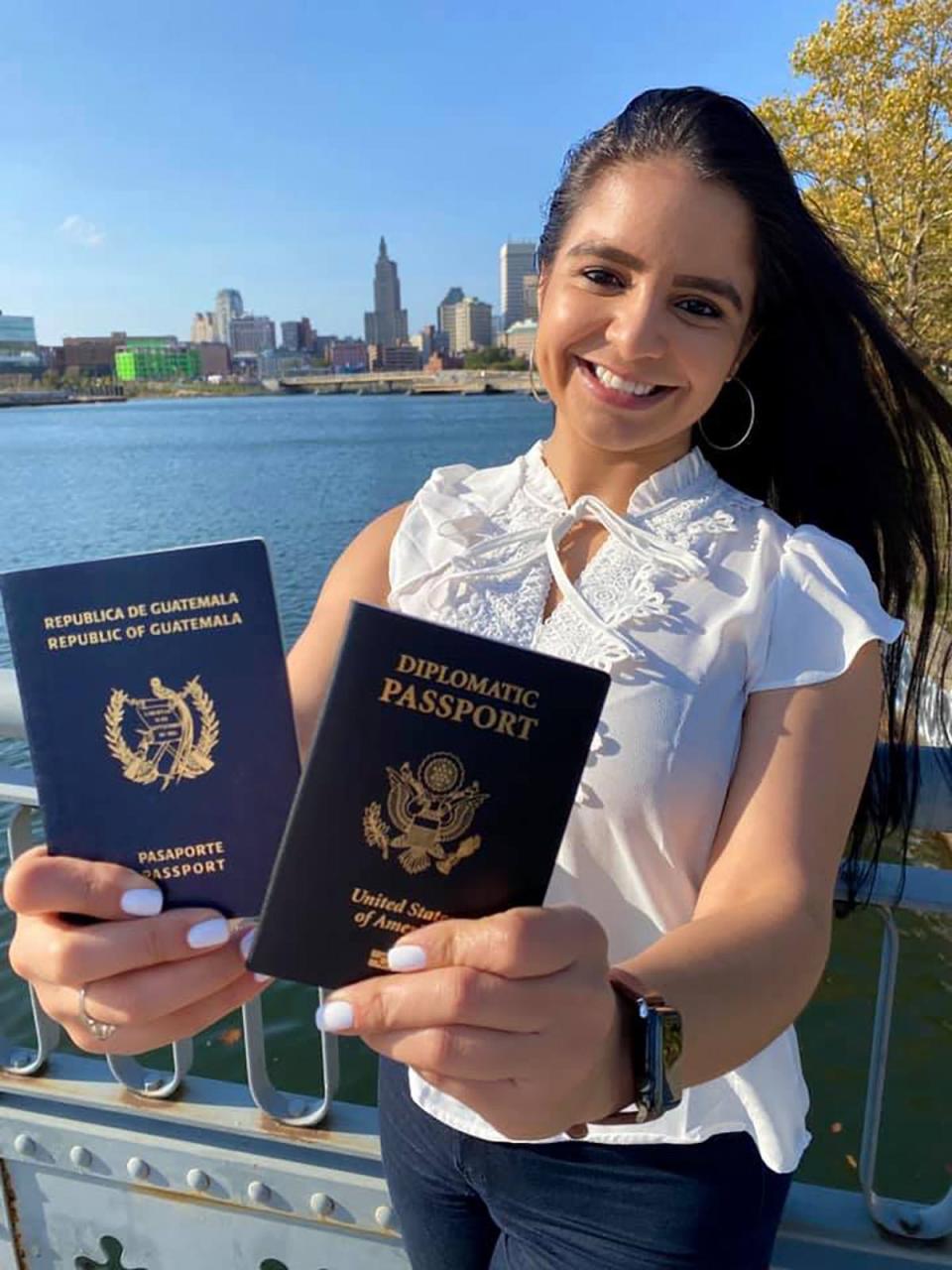From Guatemala to Providence at age 11 — now she's a diplomat representing our country
One of the most-watched Ted Talks is about the main ingredient to success, more so than intelligence and hard work.
It’s grit.
The ability to persevere through hardship.
And here now, in front of a class at Central High School, I am watching one of the best examples of it I know.
I give you Marta Aparicio.
What a story Marta is, an almost impossible tale of overcoming — a girl who came here from Guatemala at age 11 with no English. Who at 17, while a student at Hope High, was forced to leave her dysfunctional Providence household. Forced to earn money to rent a room and live on her own.

Then pushed herself through thoughts of dropping out, as well as depression so deep she considered ending things.
But Marta had this trait in her, this grit, so she hung on and was surprised when, at the end of senior year, they told her what she had accomplished — she was valedictorian of the Hope High class of 2010.
And now, at age 31, Marta was last week brought back as a visitor to Providence to share her journey. Brought to speak to Central High School kids like herself — mostly of color, many facing the kinds of hardships you don’t often find on the other side of the city.
Kids who, because of deprivation, have not all come to see themselves as capable of great worldly things.
Marta certainly didn’t at their age.
But now, here she is, a member of the U.S. Foreign Service. Marta Aparicio is finishing a two-year posting to Laos and soon will be on her way to the U.S. Embassy in Honduras.
“When I was in high school,” she tells the class, “I didn’t know what a diplomat was.”
Yet, today, she is one, a model of the kind of diplomat of which this nation needs more.

As Marta herself told the class, the State Department began almost exclusively with white men of means from the East Coast. But here now is Marta, from a background of poverty, both in her Guatemalan village and on the west side of Providence.
She tells the class that only 6% of U.S. diplomats are Latino, but the goal is more, and she sees a proud mission in being part of that, representing the country she loves — showing people overseas what America and the American government look like.
What an unlikely journey for Marta, who as a 17-year-old living alone would wake at 4 a.m. in her rented room to do homework, the only time she had for it because of two jobs, one at a nursing home, the other as a dietary aide at Miriam Hospital.
She tells the class that she held on because mentors believed in her. And yet, because of her lack of means, money, parenting and, early on, English, she thought often of leaving school.
Her Hope adviser, Stephanie Saint Aubin, would not let her.
“Marta,” Stephanie said, “you can’t give up. Education is what opens doors.”
Other mentors told her the same, including Steve Cronin, an East Providence printing executive who taught a Life Skills class that Marta attended. So she persevered.
And now she has been brought to this Central High School class by Cronin, who continues on his mission. Mayor Brett Smiley is here this day to introduce her, and former U.S. Rep. David Cicilline is in the audience because both know that Marta is what the American story is about, a story known to generations of immigrants who strived against hardship to become part of the fabric that makes us what we are.
Early on, Marta tells the class, like so many, she doubted herself — applying to 16 colleges, hoping to get into just one. She was accepted by almost all, including Brown.
Growing up in Providence: Ed Cooley's greatest victory: overcoming a childhood of poverty in South Providence
Yet Marta's mentors told her to stretch her world, so she went to Georgetown University in Washington.
When a student like Marta enrolls in such a prestigious place, one thinks they’ve at last arrived, but in reality, there is usually more struggle.
Despite Georgetown being a liberal institution, Marta found herself dealing with labels implying she was “other” — labels like Latino, first generation, person of color, low income. There was an implication she wasn’t good enough to be there.
But over time, she tells the Central class, she realized labels don’t define who you are.
“I’m just Marta,” she says with a smile.
Then she tells them she knows many here have struggles, just as she did.
A life saver: This RI high schooler is pen pals with a player on the NY Jets. Why it may save his life.
“It’s OK to cry,” Marta says, “but the next day, keep going — and do it for yourself.”
In 2018, out of 600 applicants, Marta was one of 30 picked for the State Department's Charles B. Rangel Fellowship in international affairs at Columbia University.
And now, the girl who arrived in this area with no English at age 11 and survived in a rented room on her own as a teenager, represents all of us as a U.S. diplomat, the last two years in Laos, soon Honduras, and from there, well, Marta can’t wait to see where her path will lead.
One can’t help but think Marta Aparicio’s name will be more widely known as she charts her way.
And just maybe we will know the names of others in this Central High class, who saw what they, too, can be.
If they harness this thing that Marta’s example teaches to them, and really to all of us, which is the power of grit.
mpatinki@providencejournal.com
This article originally appeared on The Providence Journal: Diplomat Marta Aparicio talks to Central High students about journey

